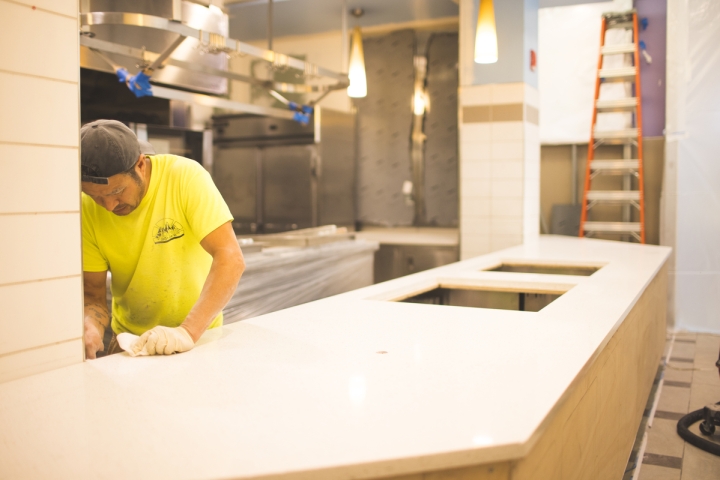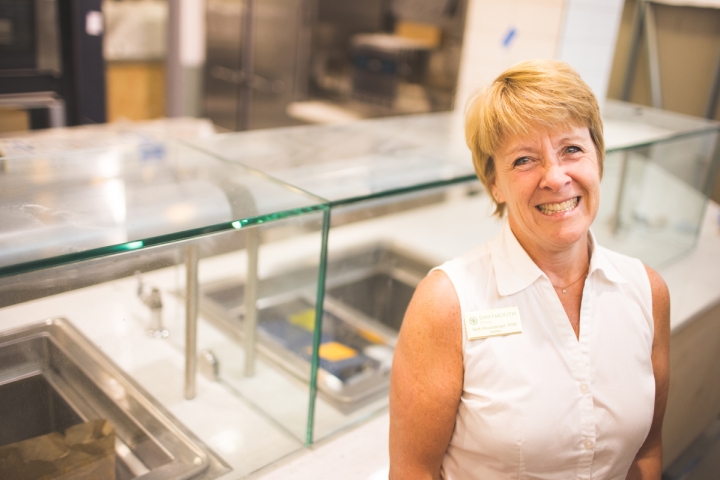Dartmouth Dining is working with Campus Services to build a serving area in the Class of 1953 Commons that will be certified free of the nine most common food allergens, scheduled for a grand opening this fall term.
The new station, known as “The A9,” will be fully self-contained with its own state-of-the-art equipment, separate food storage areas, a dedicated staff of two assistant chefs and a line server, and a supply chain certified allergen-free by both suppliers and distributors, says Jon Plodzik, director of Dartmouth Dining.
“There’s been a growing need for us to address the increasing number of students who have food allergies,” Plodzik says. “In the last five to six years it has been really compounding in complexity.”
Data collected during the COVID-19 pandemic, when dining services was preparing meals to go, showed that between 20% and 30% of students were specifying food intolerances, he says. And while not all these instances were necessarily based solely on allergies, it underscored the scope of the issue.
All the food and supplies for the station will be certified from the manufacturer and distributors to be free of the nine most common allergens—dairy, eggs, fish, shellfish, peanuts, tree nuts, sesame, wheat, and soy, says Beth Rosenberger, registered dietitian and nutritionist for dining services.
“That’s why we call it ‘A9,’” says Rosenberger, who has been working with incoming students and their families for decades to ensure that their dietary needs are understood and met by Dartmouth.
In fact, Rosenberger and Plodzik testified in Concord on behalf of a bill, signed into law in 2016, that allowed dining services in colleges and K-12 schools in New Hampshire to have epinephrine shots, known as EpiPens, available on site in cafeterias and dining halls without a prescription to be used in case of life-threatening allergic reactions.
The new A9 service area is another important step toward reducing students’ concerns about being exposed to food that could threaten their health, Rosenberger says.
“Some of these students have never had such a wide choice of foods, and you can understand that some of them just want to enjoy a meal with their friends and not have to worry or feel singled out. This new station will be safe, and easy, and attractive, while minimizing the risk of cross-contact,” she says.

No matter how careful the dining staff is about preparing safe meals, Plodzik says, “in a self-serve setting, someone could always, say, accidentally drop a shrimp in the salad bar. This is the kind of thing that keeps us up at night.”
The new A9 service area will offer lunch and dinner seven days a week, will include its own salad bar, and will have two chefs and a line server who only work in that area, getting to know all the student diners who come through, says Chris Kaschak, executive chef for Dartmouth Dining. The A9 crew will prepare all the dishes in a clean room with dedicated utensils and certified ingredients.
And they will be striving to exceed all food safety standards in a very important way, Kaschak says—deliciousness.
Some of the recipes Kaschak and his sous chefs are developing for The A9 include Cambodian beef stew, pumpkin-braised chicken, deconstructed chicken egg rolls, espresso rubbed pork tenderloin, and Slovak stuffed cabbage, he says.
“We want to make it an eating pleasure.”

